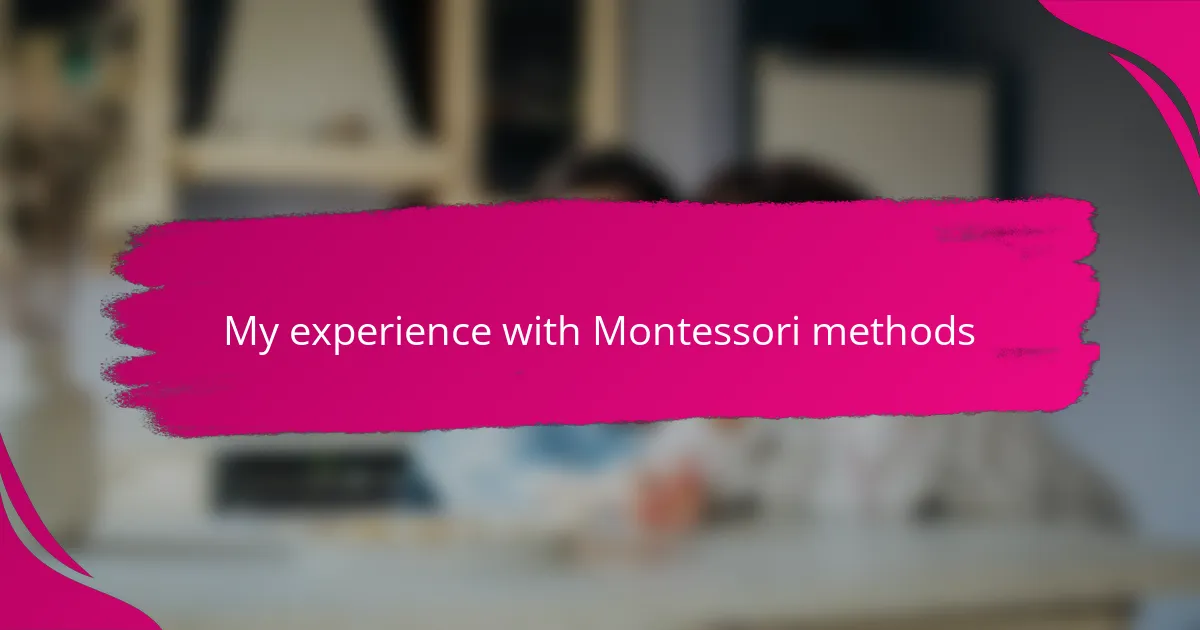Key takeaways
- Montessori methods focus on nurturing a child’s curiosity and fostering independence through a prepared environment and hands-on learning.
- Key principles include respecting individuality, promoting practical life skills, and emphasizing patience for both parents and children.
- Setting up an engaging Montessori environment uses natural materials and accessible activities to enhance a child’s autonomy and concentration.
- Challenges in Montessori parenting involve balancing freedom with guidance, the effort required to create an optimal environment, and learning to allow children to struggle and grow through their experiences.

Understanding Montessori Methods
When I first encountered Montessori methods, I was struck by how much emphasis is placed on nurturing a child’s natural curiosity rather than enforcing rigid lessons. Have you ever noticed how children seem to learn best when they explore at their own pace? This approach answered that question for me and shifted my entire perspective on education.
What really captivated me was the idea of the prepared environment—spaces thoughtfully designed to encourage independence and hands-on learning. Watching my child choose activities freely and focus deeply made me realize how powerful a child’s autonomy can be in fostering confidence and joy in learning. It wasn’t just teaching; it was creating an inviting world for discovery.
Understanding Montessori also made me reflect on the role of the [censured]—not as a traditional teacher, but as a guide or facilitator. This subtle shift was emotional for me because it encouraged patience and respect, allowing my child to develop self-discipline naturally. Isn’t it fascinating how changing the way we support our kids can transform their entire learning experience?
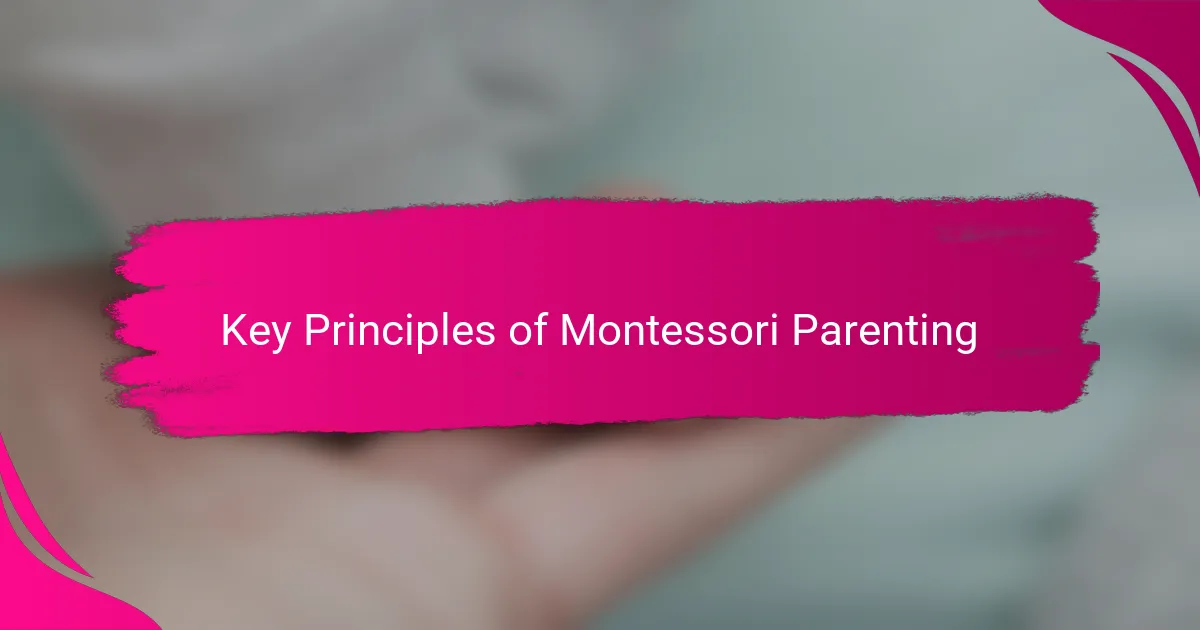
Key Principles of Montessori Parenting
One key principle of Montessori parenting that truly resonated with me is the respect for a child’s individuality. Instead of pushing them to conform to a set schedule, I learned to observe and respond to my child’s unique interests and rhythms. Have you ever been amazed by how much more engaged your child is when they feel seen and respected? That realization completely changed how I approach daily interactions.
Another crucial aspect is fostering independence through purposeful activities. I remember setting up simple tasks like pouring water or sorting objects, and watching my child’s face light up with pride as they accomplished them alone. It’s incredible how such small steps build a foundation of confidence and responsibility—qualities I want my child to carry into adulthood.
Lastly, patience became my strongest ally in this journey. Montessori parenting taught me to resist the urge to rush or correct too quickly, allowing my child to make mistakes and learn at their own pace. Have you noticed that when you give your child space to grow, they surprise you with their resilience and creativity? Embracing this slowed-down approach made our parenting experience far more rewarding.
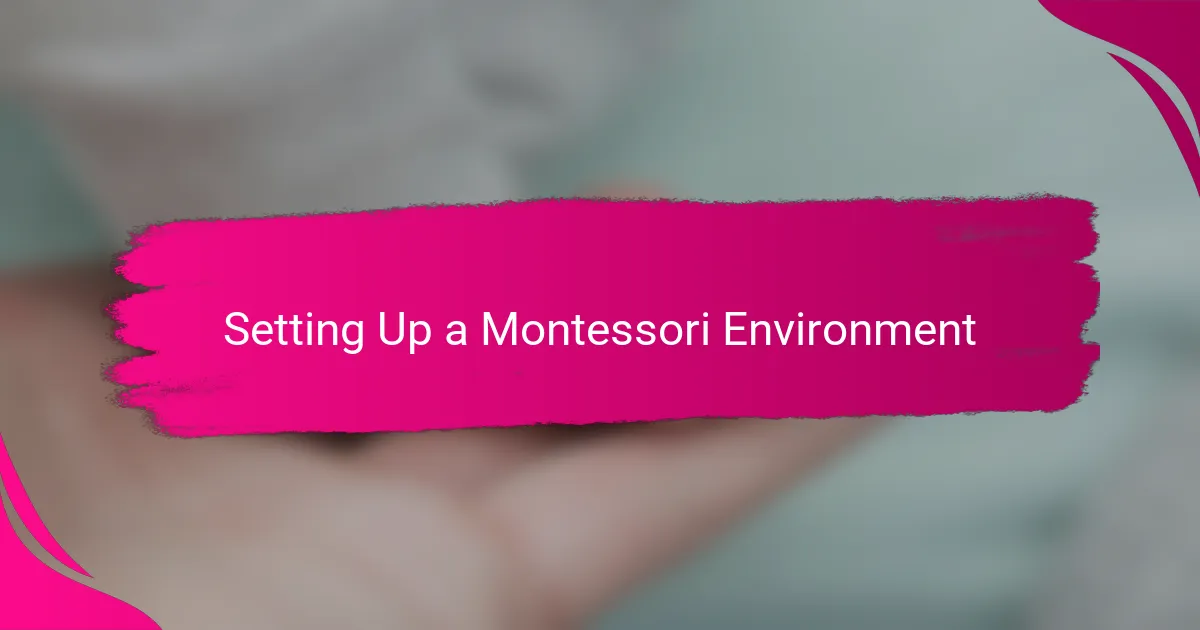
Setting Up a Montessori Environment
Creating a Montessori environment in our home meant thoughtfully arranging everything at my child’s level—from shelves to materials—so independence wasn’t just encouraged; it was practically unavoidable. Have you ever seen the pride on a child’s face when they can reach for something by themselves? That small shift in accessibility made a huge difference in fostering autonomy.
I also found that choosing natural materials like wood and fabric instead of flashy plastic toys helped keep distractions at bay and invited real concentration. It felt like crafting a calm, inviting space where my child’s curiosity could truly flourish without overwhelm. Don’t you think simplicity often speaks louder than complexity, especially for young learners?
One day, I watched as my child spent over an hour carefully pouring water from one jug to another, completely absorbed in the task. This wasn’t just play; it was a powerful lesson in focus and control, all because the environment was set up to honor that learning process. How often do we underestimate the impact of the space around our kids on their ability to engage deeply?
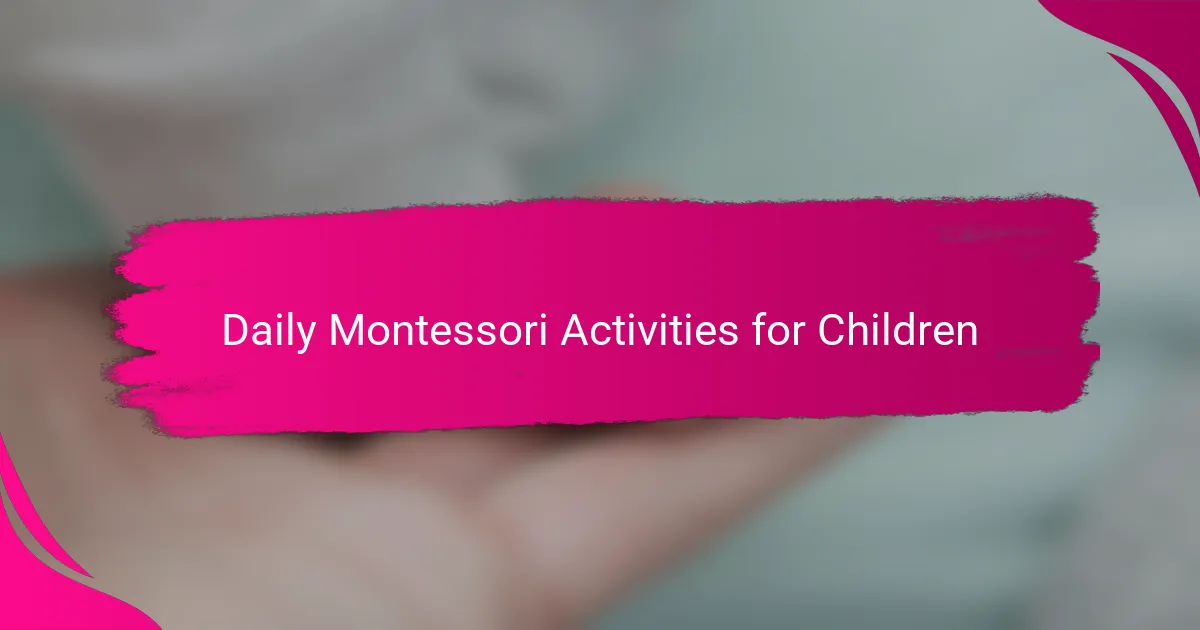
Daily Montessori Activities for Children
One of the daily Montessori activities we embraced was practical life skills, like folding laundry or preparing a simple snack. I was amazed at how these seemingly ordinary tasks transformed into moments of deep concentration and accomplishment for my child. Have you ever witnessed your little one beam with pride after doing something independently? That’s the magic Montessori brings to everyday routines.
Another favorite was sensory play, where my child explored textures, smells, and sounds through carefully chosen materials. I noticed how these activities didn’t just entertain but genuinely nurtured fine motor skills and sensory awareness. Did it surprise you how something as simple as sorting beans or feeling different fabrics can hold a child’s focus for so long? It certainly did for me, proving that hands-on learning is incredibly powerful.
We also incorporated nature-inspired activities daily, like watering plants or observing the changing seasons through walks. I found these moments grounded both of us, connecting my child to the world beyond our home while sparking endless questions. Isn’t it wonderful how Montessori encourages children to see learning not as a task but as part of everyday life? That perspective changed how I view parenting entirely.

Challenges Faced with Montessori Approach
Adopting the Montessori approach wasn’t without its hurdles. I quickly realized that allowing my child complete freedom to choose activities sometimes led to frustration—for both of us—when they circled back repeatedly to one task without moving forward. Have you ever wondered how to balance guidance with freedom? Finding that sweet spot was a learning curve for me.
Another challenge was the initial setup. Creating a truly prepared environment demanded time, patience, and a careful eye for detail. I remember feeling overwhelmed arranging shelves and selecting materials just right, worried I’d miss something crucial. Does anyone else feel that pressure to get it perfect before even starting? It made me appreciate how much thought goes into Montessori spaces beyond what you see on the surface.
Finally, there was the patience test. Watching my child struggle with a task without stepping in was tough emotionally. I questioned if I was being negligent or supportive. How do parents know when to intervene and when to trust the process? Over time, I learned that stepping back nurtured resilience, but it wasn’t easy to do initially.

Personal Benefits Observed from Montessori
One of the most rewarding personal benefits I noticed was my child’s growing confidence. It was genuinely moving to witness how choosing activities independently made them stand taller and glow with pride. Have you ever seen your child’s eyes light up after accomplishing something all on their own? That moment of self-assurance is priceless.
Beyond confidence, I observed an incredible boost in my child’s concentration. Tasks that once seemed simple became absorbing challenges they tackled with remarkable focus. It surprised me how a calm, Montessori-inspired space could cultivate such deep attention, making learning feel less like a chore and more like an adventure.
Lastly, the development of patience in both of us stood out as a profound benefit. I learned to slow down, allowing my child to face small struggles without immediate rescue. It was tough at times, but didn’t those challenges teach resilience and problem-solving better than any quick fix ever could? This shift changed not just how my child grows but how I grew as a parent too.
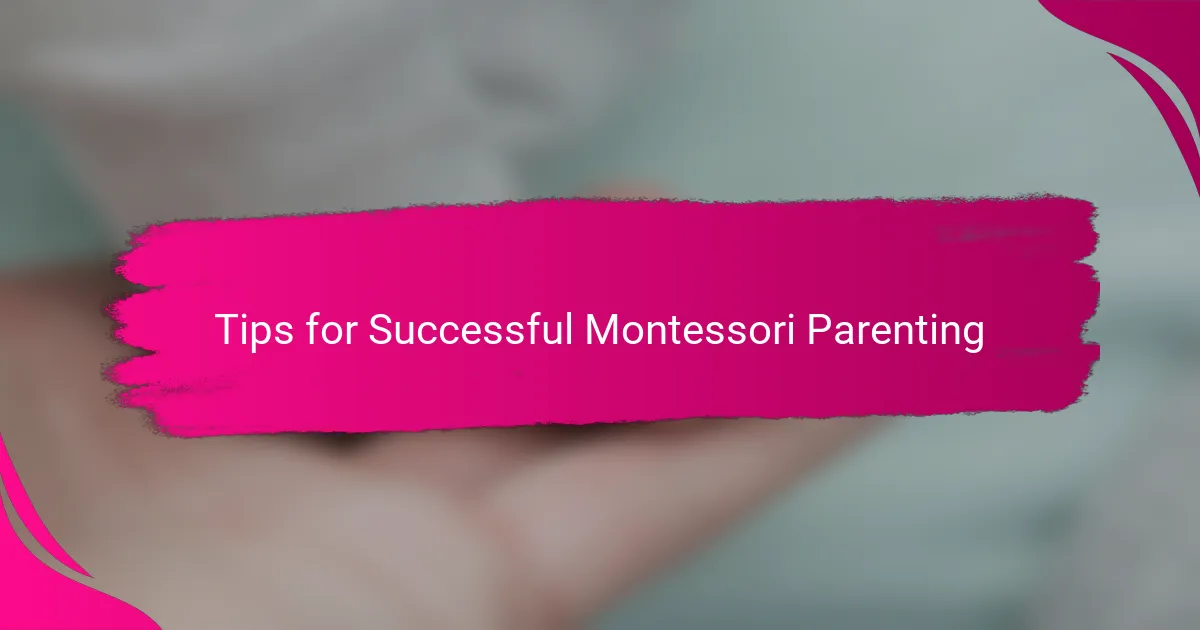
Tips for Successful Montessori Parenting
One tip I found invaluable was embracing simplicity in our routines. Instead of overwhelming my child—and myself—with countless activities, focusing on a few meaningful ones sparked deeper engagement and joy. Have you noticed how less sometimes truly is more when it comes to your child’s learning? That balance made our days smoother and more fulfilling.
Another piece of advice I hold dear is to model patience and curiosity myself. When I approached challenges alongside my child, asking questions instead of rushing to answers, it transformed our interactions. Isn’t it amazing how children pick up on our attitudes and mirror them? Cultivating that calm and inquisitive atmosphere felt like planting seeds for lifelong learning.
Lastly, I learned to trust the process even on tough days. There were moments of doubt when progress seemed slow, but stepping back and allowing my child to lead allowed their natural strengths to shine. Have you ever witnessed that quiet breakthrough when a child finally conquers a challenge on their own? Those moments reaffirmed that Montessori parenting isn’t about perfection but presence and patience.
